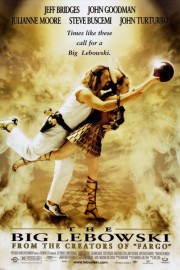The Big Lebowski
I can’t wait to see how the Coen Brothers follow up “True Grit.”
You see, while “True Grit” went home empty-hand on Oscar night, it is another unmitigated triumph for Joel and Ethan nonetheless, with not only 10 Oscar nods but also the biggest box-office of the brother’s careers. The last time they had such success was with 2007’s “No Country for Old Men,” which was followed up immediately by the wacky “Burn After Reading.” Ten years before that, they had success with “Fargo,” which was followed up immediately with “The Big Lebowski.” So as you can see, I can’t wait to see how they follow up “True Grit.”
I can understand why people may not like this film. The story doesn’t really go anywhere. The comedy is the typically off-kilter silliness we expect from the Coens. And the Dude, well, the Dude is the Dude. What does that mean? Starting with Sam Elliott’s narration, we are put in a definite frame of mind that only watching “The Big Lebowski” can really make you understand. As Elliott’s narrator sets the stage, we see the Dude Lebowski (Jeff Bridges) in his bermuda shorts, bathrobe and sunglasses as he’s buying half-and-half for his White Russians. He opens the carton while in the store, and when he checks out, he writes a check for $.69. When he gets home, he is jumped by two thugs. The blonde-haired one grabs the Dude and puts his head in the toilet while the Asian American one pisses on his rug. They’re looking for a millionaire, which the Dude is very much not.
From that opening, the movie moves into high-gear. Well, high as in the Dude’s frequent pot-smoking; the Coens have to do some pushing to get the Dude to go along with their ideas for this almost surreal take on film noir, in particular the work of Raymond Chandler (“The Big Sleep,” “Double Indemnity”). If you’ll recall my review of “The Big Sleep” in the previous week’s “A Movie a Week,” that story didn’t have much of a solution to the plot. Neither does “Lebowski.” As the story moves ridiculously between stolen cars, bowling, porn kingpins, more bowling, the world of “vaginal” art, yet more bowling, and dream sequences that would make both Luis Bunuel and Busby Berkley blush, the Coen Brothers don’t really care about character arcs or plot holes. “The Big Lebowski” is about playing with storytelling conventions, cinematic style (Roger Deakins is an inspired choice to shoot this film, and Carter Burwell has some great musical sound designs going on here), and showing us moments of sheer lunacy. How else can you explain the torture method German Nihilists employ by putting a marmot in the bathtub with the Dude? Or the bravado of the millionaire Jeffrey Lebowski (David Huddleston), whose mansion is reminiscent of Charles Foster Kane’s Xanadu in “Citizen Kane,” when his trophy wife Bunny (Tara Reid) is kidnapped? Or the way Lebowski’s daughter Maude (Julianne Moore) goes from rug-taker to “fucking lady friend” in her dealings with the Dude?
No one but Jeff Bridges could play “The Dude.” It’s one of those roles that the people who create it can only see one person in it; Bill Murray’s role in “Groundhog Day” and the duel roles for Nicolas Cage in “Adaptation.” appear to be similar instances. Over the years, it’s become impossible for people to see Bridges and not look at the Dude as an autobiographical role. I don’t think that’s true (per se; one look at roles like his surfer penguin in “Surf’s Up” or his reprisal of his role of Flynn in “TRON: Legacy” and you can see “The Dude” in their DNA); Bridges in just an actor who digs deep into his characters. Think his country singer in “Crazy Heart”; his crash survivor in “Fearless”; his alien impersonating a human in “Starman”; his alcoholic U.S. marshal in “True Grit”; his car mogul-turned-horse racer in “Seabiscuit.” A born actor, Bridges understands his characters in and out by the time the cameras are rolling. When playing “The Dude,” he would ask the Coens if the Dude had doped up before a scene; I’m sure 90% of the time, the answer was “yes.” That type of surreal “altered state” is one the film operates in throughout, and it’s a huge part of the film’s entertainment value.
But Bridges isn’t the only standout in this cast. How could I go a review without mentioning John Goodman as the Dude’s hot-headed bowling partner Walter, whose obsession with Vietnam clouds his judgment about, well, everything? Or Steve Buscemi’s perpetually ignored Donnie, who always seems to come in in the middle of the conversation? Or Phillip Seymour Hoffman’s Brandt, the elder Lebowski’s assistant who has a an insane laughing manner to go with his stoic delivery? And of course there’s John Turturro’s Jesus, the Hispanic bowler who we learn was a pedophile, and had to go door-to-door admitting as much in a scene we hear happens in real life, but most of us never really see. And did I mention Tara Reid’s Bunny, who in one big scene– where she tells the Dude, “I’ll suck your cock for a thousand dollars.” –delivers the best performance of her career?
There’s a reason this film has become a cult classic. There’s a lot of reasons, in fact. The performances. The characters. The madness. The dialogue (my favorite line– The Dude: “I still jerk off manually.” Jackie Treehorn: “Of course you do.”). And of course the Dude. When he says at the end, “The Dude abides,” we can’t help but think that the world will be a better place for that being true.










